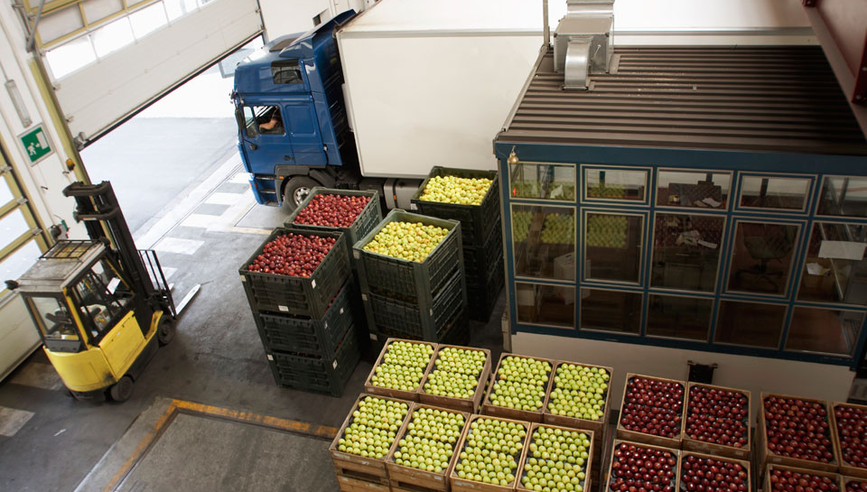4 Best Practices for Navigating FSMA Compliance

This article was created by Risk & Insurance in partnership with Travelers.
Many things can go wrong during the transportation of food.
Lax sanitation and temperature control can lead to outbreaks of foodborne illness with harmful effects on consumers. Poor security can result in contamination or thefts of entire shipments. Ambiguous contract language could result in finger pointing among food suppliers, shippers, carriers, distributors and their insurers.
The transportation of human and animal food is subject to strict federal regulation.
The FDA Food Safety Modernization Act (FSMA) rule on Sanitary Transportation of Human and Animal Food, which took effect in April 2017, seeks to strengthen safety standards even further by mandating record-keeping requirements for each party in the food transportation chain.
It does not, however, introduce unfamiliar protocols or change how damage or adulteration is determined.
Defining what qualifies as damage/adulteration remains to be defined by the Food, Drug and Cosmetics Act of 2005. Also, the Carmack Amendment of 1935 remains the legislative authority on motor carriers’ legal liability. Because the FSMA reinforces existing best practices, it doesn’t increase exposure or impact the liability landscape within the food supply chain.
“It was not the FDA’s intent to change how the cargo insurance claims process is handled,” said Ray Lampley, Associate Manager, Travelers Inland Marine Claims. “It continues to show itself to be more of a perceived risk than a real risk from an insurance and claims perspective.”
“Many motor carriers are already meeting the performance-based standards put forth by the FSMA,” said Adam Sellars, Travelers Inland Marine Risk Control Specialist. “The challenge will lie in formalizing their documentation procedures.”
To fulfill their record-keeping requirements in the areas of training, sanitation, and temperature control—and help protect themselves from any new exposure or potential claim situation—motor carriers should consider these best practices:
1. Training
Driver training is required at time of hire, but it needs to expand beyond the basics of operating a tractor trailer. Drivers must be made aware of their responsibilities in ensuring the safety of their shipment from start to finish. And per the FSMA, there must be documentation of that training.
“Drivers will have their traditional orientation that relates to collision avoidance and defensive driving. But they also need training that is specific to safe food handling and sanitary transportation,” Sellars said.
That begins before the cargo is even loaded. Drivers should first ensure their trailer is clean and maintained at the proper temperature when hauling refrigerated/frozen foods. A carrier should develop and implement written procedures that specify practices for cleaning, sanitizing if necessary, inspecting vehicles and transportation equipment, and specifying how they will monitor and record in transit temperatures.
2. Sanitation
Maintaining clean trailers is paramount to the prevention of cross-contamination. Records should specify practices for cleaning, sanitizing if necessary, and inspecting vehicles and transportation equipment. That may be the responsibility of the shipper or the carrier, depending on what their contract stipulates.
“The FSMA doesn’t provide any specific recommendation around how or when the trailer should be cleaned. They leave that up to the transportation parties and shippers to decide. The key element is ensuring that records are maintained that demonstrate appropriate cleaning and sanitation practices were implemented,” Sellars said.
“If the shipper cleaned the trailer before loading, the shipper should document that. The carrier should obtain copies of that record or validate it themselves.”
3. Temperature monitoring
Temperature control is one of the most important aspects of preventing the growth of bacteria that can lead to illness. The traditional way to monitor temperature is for the driver to pull over periodically and check the trailer temperature manually, recording the numbers on a paper log. But that method can be far from perfect.
When using this method, it may be too late to save the cargo from spoilage by the time the driver discovers an inadequate reading and arranges for a maintenance provider or backup truck to get to the location.
“The rule doesn’t require carriers to have a system in place for real-time monitoring, but many leading carriers are using that technology. Some of the more sophisticated shippers will use telemetry to monitor temperatures in transit,” Sellars said. “That way a sensor can send an alert to the driver or a main office as soon as the temperature approaches an unsafe level, and action can be taken immediately to reroute that truck or otherwise fix the issue.”
Pre-cooling a trailer before cold foods are loaded is also an important step.
“You want to make sure that the trailer itself along with the air within it is at a certain temperature before loading. If you’re loading cold products into a warm trailer, you can change the dynamics very quickly as the refrigeration system may not be able to maintain appropriate temperatures,” Sellars said. “That can vary depending on the type of trailer, the insulation characteristics of that trailer, and the temperatures that are needed during transit.”
An acceptable temperature range for loading should be specified in writing, and verified by the driver before setting off.
4. Security
“While the FSMA rule does not identify cargo security requirements, the controls that a carrier has in place around this will factor into their overall risk mitigation strategy. Theft of cargo and damage from pilferage is one of the more frequent and severe types of claims that we see,” Sellars said. Cargo theft is bad enough, but carriers can incur huge losses even if nothing is stolen.
“If the seal on the trailer door is broken or cargo is otherwise accessed by those seeking to steal, there may be concerns of contamination. You can’t be sure in some cases who or what got inside and whether the food has been damaged/adulterated in any way,” Sellars said.
To prevent that scenario, Travelers promotes the use of specialized housings and locks around seals and doors which can prevent unauthorized access.
The importance of broad coverage and expertise
For motor carriers, the key to protecting themselves against all types of claims is having broad insurance coverage.
“Some insurers may stick to a very black and white interpretation of adulteration. They may require additional testing to find the exact contaminant. Without that testing, they can deny coverage due to lack of proof,” Lampley said. Those insurers may now be scrambling to update their policy forms or draft new products to account for gaps in existing coverage forms.
“At Travelers, our legal liability coverage form is already broad enough to provide coverage for the exposures carriers face. Anything that could be deemed unsanitary under the definitions of the FSMA or the Food, Drug and Cosmetics Act could be covered by us,” he said. That could, for example, include a situation where a receiver rejects a shipment because of evidence that the goods were either held or transported under unsanitary conditions.
“Even if there is no visible proof that the food is contaminated, it still could meet the FDA’s definition of damage/adulteration, so we may consider that damaged goods and cover that loss,” Lampley said. “We have studied this new regulation for the past three years, and our expertise around the law means we can sort through its implications very quickly, and we’ve determined we don’t have to update our coverages. Our expertise means that no matter what new regulations come along, Travelers is ahead of the game.”



